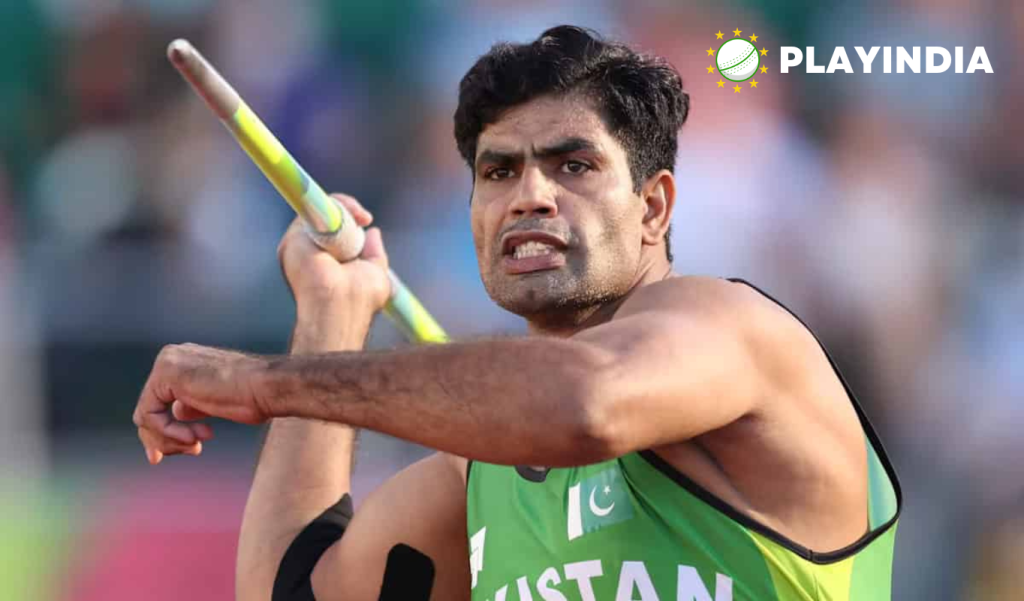Pakistan – Arshad Nadeem, Pakistan’s celebrated gold medalist at the Paris 2024 Olympics, has garnered widespread attention for both his exceptional performance and the unique gifts he has received. Nadeem secured the top position in the Men’s Javelin Throw, marking Pakistan’s sole medal in the Games and etching his name in the country’s sports history. His accolades and the subsequent rewards, however, have become a topic of interest due to their unconventional nature.
Arshad Nadeem’s Olympic triumph not only elevated his status as a national hero but also highlighted the varied forms of appreciation that athletes receive. One of the most talked-about gifts came from his father-in-law, who bestowed upon him a buffalo. This gift, as reported, will be kept at Nadeem’s father-in-law’s house, symbolizing a traditional gesture of goodwill and prosperity. In many cultures, including rural Pakistan, livestock such as buffaloes are considered valuable assets, representing both wealth and sustenance.
In addition to the buffalo, Nadeem is set to receive a brand new Suzuki Alto car, thanks to Pakistani-American businessman Ali Sheikhani. Sheikhani’s announcement underscores a modern acknowledgment of Nadeem’s achievements, blending the traditional and contemporary expressions of gratitude. The Suzuki Alto, while modest in comparison to luxury vehicles, is a practical and reliable car, reflecting the pragmatic approach of rewarding excellence in sports.
Nadeem’s journey to the gold medal was a testament to his dedication and hard work. Competing against the world’s best, he showcased not only his physical prowess but also his mental fortitude. His victory brought immense pride to Pakistan, a country that often finds itself striving for recognition in the global sporting arena. The fact that he succeeded at the Olympics, the pinnacle of athletic competition, makes his achievements even more commendable.
The contrast in the types of gifts and rewards given to athletes across the world highlights the differences in cultural values and economic conditions. For instance, Vinesh Phogat, an Indian wrestler who faced disqualification in the finals, received a substantial monetary reward of Rs 4 crore from the Haryana government. This disparity in recognition and reward raises questions about the support and encouragement provided to athletes in different countries.
While Nadeem’s gifts may seem unusual to some, they are deeply rooted in cultural practices and societal norms. The buffalo, for instance, is not just a farm animal; it is a source of milk, an integral part of the agrarian lifestyle in many parts of Pakistan. Owning a buffalo can significantly contribute to a family’s livelihood, making it a meaningful and practical gift. Similarly, the Suzuki Alto, though not a high-end car, offers a means of transportation that can greatly enhance Nadeem’s daily life.
The sports community in Pakistan has rallied behind Nadeem, celebrating his success and advocating for greater support for athletes. His accomplishments have sparked conversations about the need for better infrastructure, training facilities, and financial incentives for sportspeople in the country. There is a growing recognition that athletes like Nadeem, who bring honor to the nation on the world stage, deserve comprehensive support to help them reach their full potential.
Arshad Nadeem’s story is a reminder of the diverse ways in which societies honor their heroes. His gifts, while unorthodox, are a testament to the love and respect he has earned from his community. They also reflect a broader narrative about the challenges and opportunities facing athletes in countries like Pakistan.
As Nadeem returns home with his gold medal, buffalo, and Suzuki Alto, he embodies the spirit of perseverance and excellence. His journey is not just a personal triumph but also a source of inspiration for aspiring athletes across Pakistan. His achievements underscore the importance of recognizing and rewarding talent, regardless of the form it takes.
In the end, Arshad Nadeem’s Olympic success and the gifts he received serve as a powerful narrative about the intersection of tradition, modernity, and sportsmanship. His story is a testament to the fact that true appreciation transcends material wealth, celebrating the essence of human achievement and the joy it brings to a nation.




